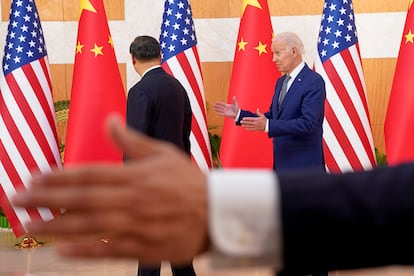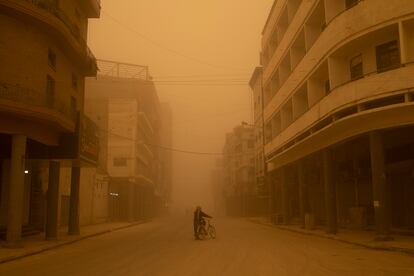Key political issues that will define 2023
EL PAÍS took a look at four major problems the world will have to contend with in the new year: the war in Ukraine, the fragile relationship between the West and China, climate change and economic turmoil

February 24, 2022, will be remembered as a turning point in 21st-century geopolitics, when Russia’s Vladimir Putin began the invasion of Ukraine. A few weeks earlier, Moscow and Beijing had signed a joint declaration proclaiming an “unconditional” bilateral relationship.
Both of these occurrences marked a new phase of global turmoil and heightened tensions.
The Russian war has caused huge disruptions, destabilizing food and energy markets and causing prices to surge in the aftermath of the pandemic. Meanwhile, distrust of an increasingly aggressive China prompted reorganization across the global supply chain, with Western governments and transnationals eager to reduce their dependence on the Asian giant’s manufacturing sector.
Before the invasion of Ukraine, China – one of Russia’s key economic guarantors – was already perceived as an authoritarian competitor, one whose state-led industries were also considered unreliable, due to extreme anti-Covid lockdowns. The fortified alliance between the two countries contributed to a global economic slowdown in 2022, while the war and rising oil prices drew attention away from the fight against climate change. In the new year, these trends will only continue.
Of course, beyond Ukraine and the South China Sea, other crises are taking place, including dramatic humanitarian situations that the media pays far too little attention to, in Yemen, Ethiopia, Iran, Palestine, Venezuela and Myanmar. But arguably, the four aforementioned issues – the war in Ukraine, the tensions between the West and China, ongoing economic turbulence and the droughts and disasters being caused by climate change – are having the greatest global impact. They will continue to cause social damage in 2023, with no sign of letting up.
EL PAÍS has taken a close look at these problems to see where things stand at the end of this year… and where they are likely heading.
The war in Ukraine
The world is watching in suspense as the conflict unfolds in Ukraine. Many voices – especially in the Global South – have been calling for a cessation of hostilities through diplomacy. Declining Ukrainian wheat exports and the rising price of gasoline – due to Russia’s blocking of ports and manipulation of oil market prices – have hurt some of the most vulnerable countries.
However, most analysts opine that negotiations don’t seem to be on the horizon. While most wars end at a table – and while it seems unlikely that either the Russian or Ukrainian side will experience total defeat after 10 months of fighting – neither of the parties involved seems willing to make concessions.
Ukraine is currently suffering from Russian attacks on its infrastructure, with blackouts and water shortages affecting millions of citizens. Yet, the majority of the population supports the right to totally expel the invading army – recent military successes against the larger, better-armed Russian forces have also boosted morale. Western countries – the guarantors of the continued Ukrainian fight – continue to send weapons and humanitarian aid to Kyiv. For the moment, with no sign of support being halted, it appears that it is up to President Volodymyr Zeleskiy and his government to decide when and how to negotiate with the Kremlin.
Despite heavy Russian losses, Putin doesn’t seem to have lost his willingness to continue his illegal offensive. The Russian Armed Forces are drafting 300,000 new troops and buying armed drones from the Iranian regime. And, while the Russian economy is undoubtedly suffering from Western sanctions, it has done better than some expected: GDP is expected to fall by only about 4%, while countries like Germany, China and India continue to buy hundreds of millions of dollars in Russian oil and natural gas every single day, leaving the Kremlin flush with cash.
Adverse winter weather conditions may slow down the fighting somewhat, but a formal ceasefire does not seem likely to be anywhere near. It appears more plausible to anticipate that the hostilities will continue at least into the first part of 2023, while attacks against critical infrastructure will generate significant movements of the civilian population, both as internally displaced persons and refugees.

The tense relationship between China and the West
Russia’s war in Ukraine logically commands attention. Yet, the future of the already-tense relationship between the West and China is even more important for the future of the world, with implications for practically all human beings.
The first face-to-face meeting between Presidents Joe Biden and Xi Jinping – held on the eve of the G20 summit in November – saw both leaders express the wish to stop the deterioration of relations. This meeting restarted a dialogue between Washington and Beijing, after House Speaker Nancy Pelosi’s visit to Taiwan over the summer infuriated the Communist Party leadership.
The New Year will tell us if the two powers will be able to prevent competition from turning into confrontation. The meeting between the leaders offered a brief respite but there is no shortage of disturbing signs ahead.
The reconfiguration of relations has not taken place on the friendliest terms. The Biden administration maintained the tariffs imposed by Donald Trump, while also increasing restrictions on Chinese access to US technology and data. Many private US companies (including Apple) are altering their supply chains to depend less heavily on China and reducing their investment in the country by about 20% compared to the previous year, according to a survey by the American Chamber of Commerce.
For its part, the Asian giant sees a conspiracy to contain its rise. To counter this, Xi – who will begin his 11th year in power in 2023 – is seeking to build a “fortress economy” that does not depend on Western investment or assets. Meanwhile, the EU is also seeking greater autonomy from the Asian manufacturing powerhouse, specifically when it comes to strategic raw materials and the microchip sector. With the exception of Canada, most Western countries are backing away from relationships with Chinese telecom companies – such as Huawei – and collaboration with Beijing on the green transition or within the pharmaceutical industry.
But it’s not just economics that have shaken trust with China. The status of Taiwan is the epicenter of tensions, with a strong Chinese reaction to the explicit and repeated commitment of the American president to come to the defense of the island nation in the event of an unprovoked attack. Experts consider it unlikely that Beijing will opt to regain control of the island by force any time soon – the results of the war in Ukraine will undoubtedly cause Beijing to be more prudent. Some analysts, on the other hand, warn that the possibility of an invasion may be getting closer.
Internal turbulence in China – linked to mass discontent over harsh Covid restrictions and a stagnating economy – could result in increased external aggression. Authoritarian regimes tend to divert attention away from internal troubles toward foreign policy issues, in order to distract the population and rally loyalists around a nationalistic cause. President Xi – who has adopted extremely violent rhetoric on the subject of Taiwan – may use the flight to war to salvage his lackluster progress at home.
Another important element to observe will be the development of Western alliances in the region, including AUKUS (Australia, United Kingdom, USA) or the Quad (Australia, India, Japan and the USA). China continues to bolster its military capabilities at a rapid pace – but Washington is also helping other players in the region bolster their armed capacity. The US is “drawing lessons from the war in Ukraine to strengthen the self-defense capabilities of [its] partners in Asia-Pacific,” the head of the Pentagon recently declared.
Economic turmoil
The two previous issues – along with others – have contributed to the post-pandemic global economic slowdown.
In 2023, some countries’ economies will inevitably sink into recession. China – the center of global manufacturing – will continue to experience public health lockdowns and stubbornlyhigh Covid-19 numbers, which will slow its economic engine. Even if companies alter their supply chains, this will take time, with resulting unfilled orders and shortages, all of which will contribute to rising prices and job losses.
Central banks across the world are facing the dilemma of how to respond: some are hiking interest rates, to get consumers to stop borrowing and spend as much as possible, but as borrowing becomes more expensive, this will also result in less investment and purchasing, which could yield higher unemployment rates.
While low-income countries are being battered by rising energy and food prices – mostly caused by the economic shocks of the war in Ukraine – high-income governments are putting together stimulus packages to help citizens and companies weather the storm. Of course, cash transfers to citizens could also loosen attempts to tighten the money supply.
There are no easy solutions to calm the socio-economic turbulence that is affecting every country. The purchasing power of citizens is declining at a steady rate – in the Eurozone, for instance, real compensation per-hour has dropped by 8% over the past two years, according to the European Central Bank. Salaries can’t seem to keep up with the rising prices of housing, transit and basic goods. In 2023, controlling inflation while attempting to keep job numbers high will be a difficult balance to strike. For the most vulnerable citizens, the New Year could present a serious cost-of-living crisis.

Climate change
The Russian war in Ukraine caused a huge disruption in the energy market. Subsequently, most nations turned their attention to energy security, shifting focus away from conservation efforts and the reduction of carbon emissions. With many European nations dependent on Russian oil and natural gas, allies such as the United States conducted outreach to petroleum-rich countries such as Saudi Arabia and Venezuela to boost production. Fearful of Putin turning off the gas, Germany even restarted its coal-fired power plants.
At the COP27 climate summit – held in Egypt in November – the results were disappointing, with no real progress made on the matter of wealthier countries compensating poorer ones in exchange for reducing emissions.
While gas prices have stabilized in the final months of 2022, this does not mean than 2023 will necessarily be risk-free. Europe still has to go through another few months of winter, when home-heating is crucial for vulnerable populations. Serious supply problems in Ukraine could hurt the defense against Russia – much of the country is already relying on generators. The dependency on Russian fossil fuels is still stubbornly high.
In addition, Europe will have to overcome its deficit in electricity production, due to serious technical problems in French nuclear power plants. As for crude oil, it’s not likely that prices will go down much further – large producers, such as Saudi Arabia, will heed Putin’s call to avoid increasing production. Oil-producing nations have little incentive to flood the market, as high prices imply more revenue for less output.
On another level, it will be essential to see if investment in renewable energy production can lead to substantial results. While the invasion of Ukraine unleashed a desperate search for new fossil fuel supplies, it has also proven that the development of green sources of energy is essential to reducing dependence on unreliable oil producers. Improving public-private frameworks to foster green energy investment will be of great importance in 2023.
A new geopolitical era, economic slowdown, inflation, a damaged environment… these are the issues that will define the coming year. Time will tell if the world – more globalized than ever – can address them.
Sign up for our weekly newsletter to get more English-language news coverage from EL PAÍS USA Edition
Tu suscripción se está usando en otro dispositivo
¿Quieres añadir otro usuario a tu suscripción?
Si continúas leyendo en este dispositivo, no se podrá leer en el otro.
FlechaTu suscripción se está usando en otro dispositivo y solo puedes acceder a EL PAÍS desde un dispositivo a la vez.
Si quieres compartir tu cuenta, cambia tu suscripción a la modalidad Premium, así podrás añadir otro usuario. Cada uno accederá con su propia cuenta de email, lo que os permitirá personalizar vuestra experiencia en EL PAÍS.
¿Tienes una suscripción de empresa? Accede aquí para contratar más cuentas.
En el caso de no saber quién está usando tu cuenta, te recomendamos cambiar tu contraseña aquí.
Si decides continuar compartiendo tu cuenta, este mensaje se mostrará en tu dispositivo y en el de la otra persona que está usando tu cuenta de forma indefinida, afectando a tu experiencia de lectura. Puedes consultar aquí los términos y condiciones de la suscripción digital.









































